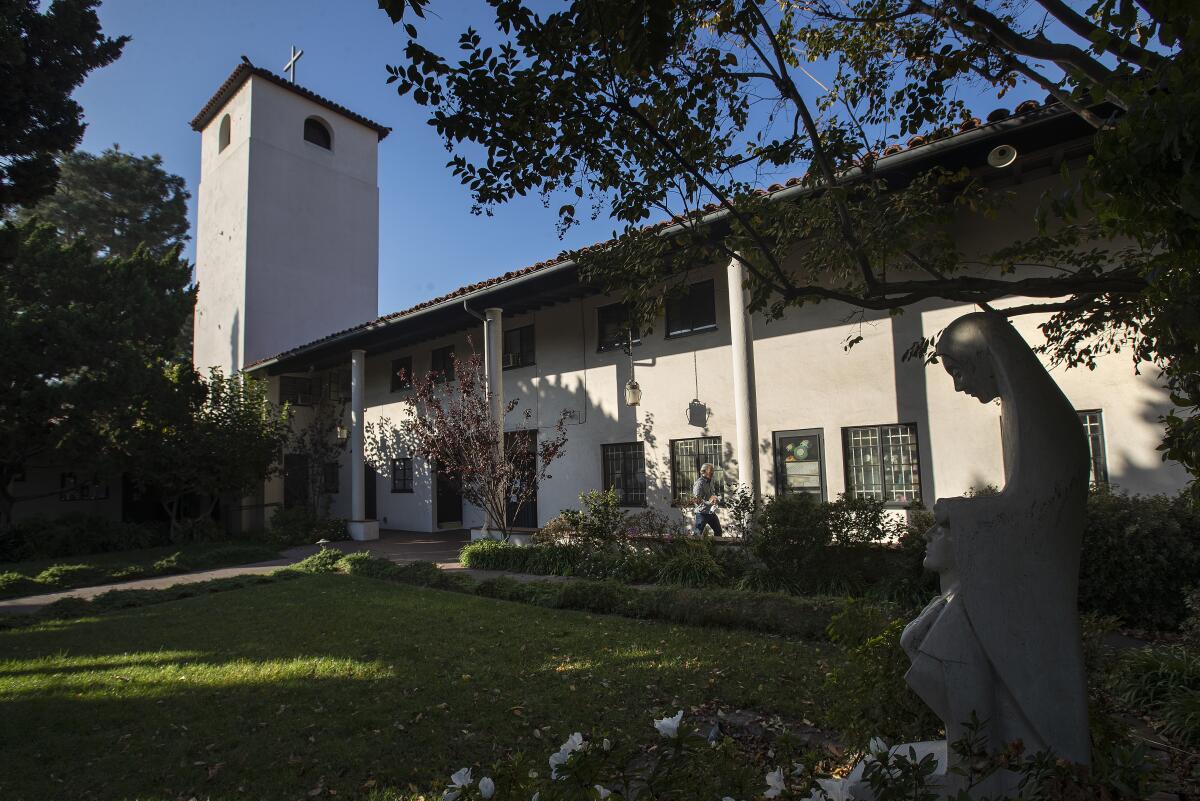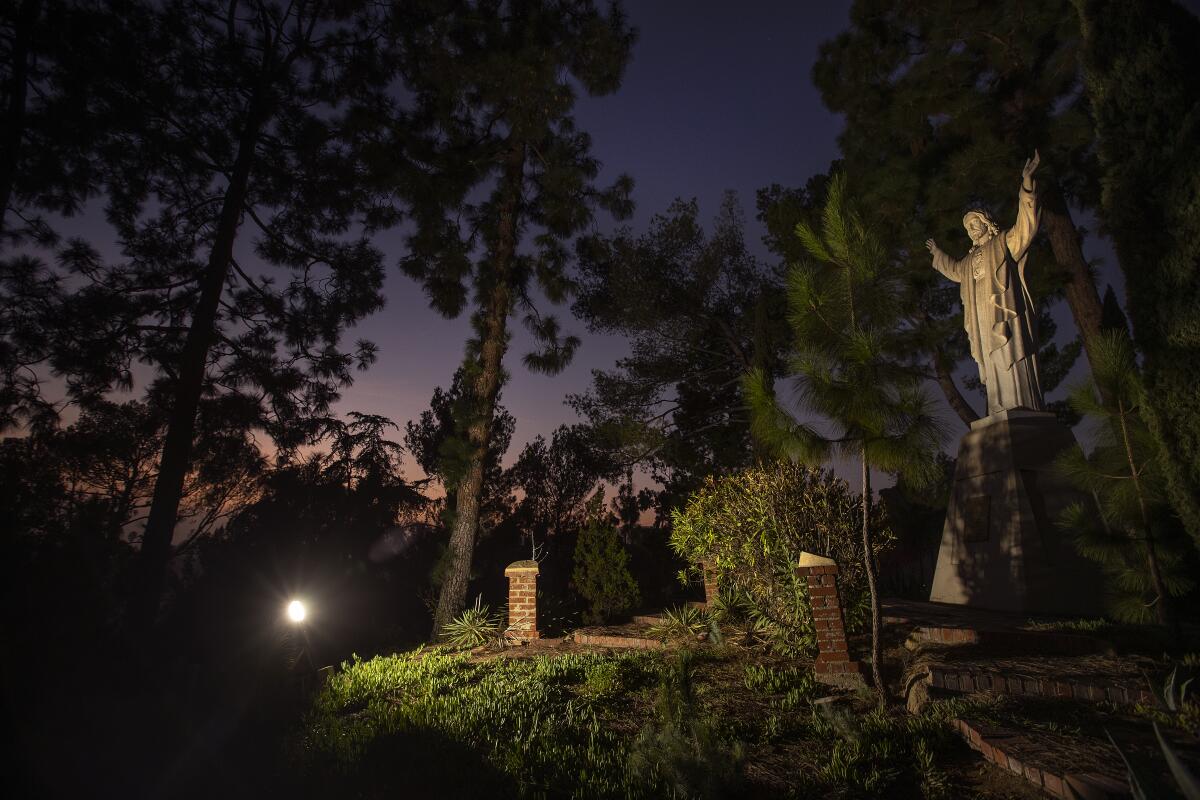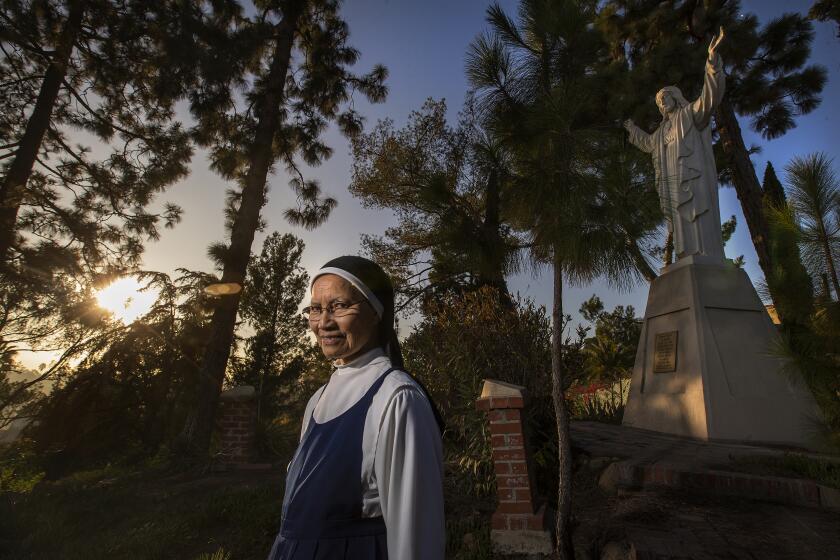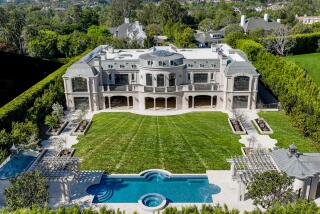Hollywood’s hidden monastery is not for sale, prioress says

For nearly 100 years, the cloistered nuns of the Monastery of the Angels have been praying for the people of Los Angeles 24 hours a day, seven days a week, from a rambling four-acre campus just below the Hollywood sign.
From this tranquil space, the nuns sell spiritual books, medallions and prayer cards, as well as hand-dipped candy and their beloved pumpkin bread to help support themselves and other local parishes. A simple chapel that is open to the public hosts Mass each day at 7 a.m.
But as the number of nuns has dwindled from a high two decades ago of more than 40 to a low in recent months of three, friends and neighbors of the monastery feared that the historic property would be put up for sale. Now, a spokesperson for the Dominican monastery has confirmed that the complex is safe — at least for the time being.

“There are a lot of rumors swirling out there, so let me be clear: There are no plans by the Dominicans to sell the property, and it is not even being considered at this time,” said Lloyd Pantell, a lawyer representing the monastery. “The areas that are open to the public — the gift store, candy shop and the chapel — will continue to run as they have in the past.”
Friends of the Monastery of the Angels in Hollywood fear that the 98-year-old convent is about to go up for sale.
Sister Maria Christine, prioress of the monastery, said the Dominican order’s goal is to upgrade and expand on the mission that the nuns began nearly 100 years ago: providing a peaceful oasis for silent prayer and contemplation.
“We welcome the supportive voices of the local Catholic community,” she wrote in an emailed statement. “Together, we will continue the work of preserving the monastery grounds as a holy and sacred space dedicated to the enrichment of the Roman Catholic Church.”
Rob Hollman, a nonprofit consultant who teamed up with local preservationists Richard Schave and Kim Cooper to launch the Monastery of the Angels Foundation of Los Angeles, said news that the monastery would not be sold was “great to hear.”
“We want to see it survive and thrive and be accessible to the community and not have another institution lost to the bulldozer,” Hollman said.
The Monastery of the Angels Foundation, which has no affiliation with the monastery or the Dominican order, is in the process of applying for nonprofit status. It aims to raise enough money to buy the monastery if it ever does go up for sale, help maintain the buildings and grounds and keep it open to the public for prayer and contemplation, even if there are no more nuns living there.

“The goal is to have it be a sanctuary for the people of L.A.,” said Hollman. “It really is a hidden gem.”
Brody Hale, a lawyer from Tyringham, Mass., who heads the St. Stephen Protomartyr Project, which seeks to preserve Catholic churches and monasteries across the nation, has been advising the founding members of the foundation since December, when he received a Google news alert about a story in The Times describing fears that the Monastery of the Angels might go up for sale.
“As part of this work, I do a Google news alert search every morning for monastery closures, church closures and church demolitions,” Hale said.
Not every church slated for demolition can be saved, but if he senses there are people who are willing to put in the work, he reaches out to offer his expertise.
“I’m an attorney. I’m good at tracking down people if I need to be,” he said.
Hale said there is value to maintaining Catholic sacred spaces, even if local communities can no longer support them.
“These structures and spaces have a tendency to radiate many graces, as we say in Catholicism,” he said. “They are spiritually enriching, mentally enriching and just all around beneficial to anyone who happens to visit them.”
Travis Price, an architect who specializes in cultural sacred spaces, agreed that preserving Catholic churches, monasteries and other places designed for religious contemplation has value, even for those who are not believers.
“Geometry talks, memories talk, and the spirit of a place is vibrant if you are open to it,” he said. “Sitting still in the modern world, going deep inside yourself, is not an easy thing. If you start to mutilate sacred space, you start to lose touch with a big part of being human.”

The Monastery of the Angels was founded in 1924 and was supported in its early days by some of L.A.’s wealthiest families, including the Dohenys, the Dockweilers, the Van de Kamps and the Hancocks.
In 1934, the order moved to a sprawling Hollywood estate that had belonged to copper-mine owner Joseph Giroux. Fourteen years later, Catholic women in Los Angeles raised funds to build the sisters a new cloister, chapel and office complex on the same site, designed by architect Wallace Neff.
For decades, the monastery was supported by fundraising teas and fashion shows at which celebrities including Bing Crosby and Don Ameche performed, but in recent years, it has suffered from financial problems and a declining membership.
In 2009, just after the recession struck, the nuns posted notice that the monastery ran the risk of becoming “a condominium or a mall or worse” due to declines in donations and investment revenue. There were 20 women living in the cloister then. After several nuns died or moved into assisted living facilities during the COVID pandemic, just three live in the monastery today.
Carlos Sanchez, general manager of the monastery, said the remaining nuns are in good shape.
“They don’t need help, they walk around, they work, they garden, they oversee the whole candy production, one works at the gift shop,” he said. “And they pray all the time. They are always praying.”
Sanchez, who has worked at the monastery for 20 years, said the past few months have been unsettling.
“Everything seems like it’s frozen,” he said. “I hope somebody with a great vision comes in and knows what to do with the place.”
Hale, the Massachusetts lawyer, said that despite the Dominicans’ statement that they have no plans to sell the property, he thinks people who care about the monastery should think carefully about what steps would need to be taken if that plan were to change.
“While I certainly welcome the statement that the property won’t be sold, I await more specifics about what that means,” he said. “In the meantime, I think everyone is going to be preparing for all contingencies and thinking ahead in a very prudent manner. I certainly am.”
More to Read
Sign up for Essential California
The most important California stories and recommendations in your inbox every morning.
You may occasionally receive promotional content from the Los Angeles Times.












